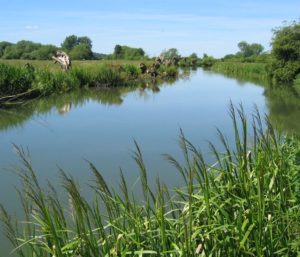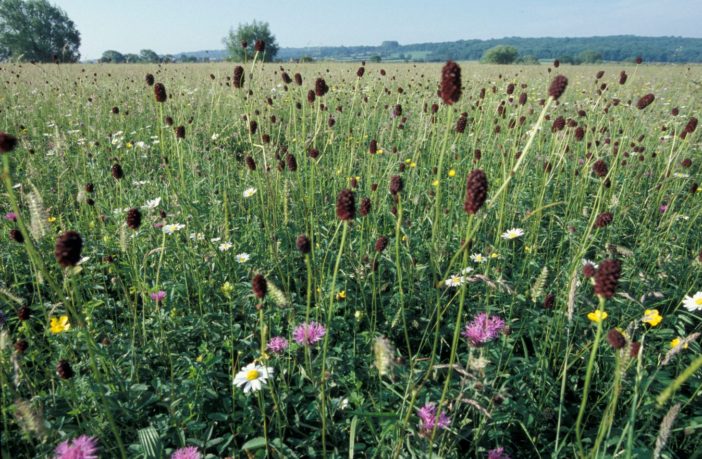The OU’s Floodplain Meadows Partnership has won a substantial grant from Ecover to help restore and protect 50 hectares of floodplain meadows along the banks of the River Thames in Oxfordshire.
The team, which includes scientists from the OU and partners; Berks, Bucks and Oxon Wildlife Trust and Long Mead Local Wildlife Site, will work with local landowners to restore one of the most important areas for floodplain meadows in the country.
As well as the restoration activity, the team aims to gather enough evidence over the course of the three-year project to prove beyond doubt that floodplain meadows are a more effective, reliable and longer-term natural carbon store than other habitats.
This innovative research into carbon sequestration could be a game changer in the race to protect the climate by proving there is a nature-based climate solution on the nation’s floodplains.
Emma Rothero, Floodplain Meadows Partnership Manager at The Open University, says, in addition to the restoration work, the funding will enable the partnership to carry out important soil analysis:
“We will be collecting the first UK-based dataset of soil carbon for floodplain meadows, which will be really important in evidencing why the restoration of species rich grasslands should be treated with the same urgency as restoration of peat and woodlands. It will also be used to encourage and advise other farmers and land managers. We’ll be sharing this information not just in this country, but with our partners in Germany and beyond.”
David Gowing, Professor of Botany and Project Director of the Floodplain Meadows Partnership at the OU said:
“Floodplain meadows stretch back a thousand years and were once the backbone of the rural economy in England. Now over 97% of these habitats have been lost. With Ecover and our partners, we will provide evidence of the value of functioning meadows and continue advocating for floodplain restoration as a vital tool in tackling the climate emergency.”

River Thames at Oxey
Catriona Bass, owner of Long Mead Local Wildlife Site and founder of Thames Valley Wildflower Meadow Restoration Project, says, it’s vital we encourage restoration of floodplain meadows:
“In a changing climate, with frequent flooding it is becoming increasingly unviable to grow arable crops in the floodplain. Oxford is currently surrounded by flooded fields with failed arable crops. Meadows with their huge diversity of plants in the hay crop are much more resilient to changing weather patterns. Floodplain meadows have been the most sustainable and economically productive means of land use for more than a thousand years.”
Berks, Bucks and Oxon Wildlife Trust’s Director of Conservation Strategy, Prue Addison, who will be contributing to the soil sampling to calculate the amount of carbon captured on floodplain meadows and neighbouring agricultural land, said:
“We are now in a nature and climate crisis – but it’s not too late to turn things around, by restoring our landscapes for the benefit of nature, climate and local communities. While it’s well known that trees soak up carbon, floodplain meadows could be our secret weapon in the battle to reach net zero. Nature has the solutions and this project enables us to show that in action at a local level, which is really exciting.”
Fertilise the Future Fund
The OU-led Floodplain Meadows Partnership beat off over 700 other projects from across Europe to secure the funding from Ecover’s ‘Fertilise the Future Fund’ and the team hope this will both inspire other similar projects and advocate their importance to policy makers, with the ultimate goal of influencing the restoration of 70,000 hectares of meadow which have been lost in England during the last century.
Local Community
Long Mead is a small farm and local wildlife site, which is connected into a huge range of local networks, through its Thames Valley Wildflower Meadow Restoration Project and Nature Recovery Network. Its outreach programme includes ground-breaking approaches to connect people with nature.
Its care-farming project, for instance, brings some of the UK’s most vulnerable and isolated members of the community into a nationally significant environmental project. The extensive programme of education and care farm-related activity uses Long Mead as a living classroom.
This Ecover-funded project will enable Long Mead to further these community links by helping people with learning disabilities and autism take part in propagating wildflower seeds with community volunteers, thereby bringing them back into the centre of the community.
Find out more
Why the Thames Valley?
The section of the Thames valley identified as the focus for this project is recognised as one of the most important in the country for floodplain meadows. It is bounded to the east by the Oxford Meads, designated a Special Area for Conservation (SAC), and to the west by Chimney Meadows National Nature Reserve (NNR). Soil samples will be collected and analysed at The Open University’s laboratories to build a picture of how carbon stores change over time.
What are Floodplain meadows?
Floodplain meadows are grasslands that provide much-needed space for flood water to spread out. Their benefits are vast and in addition to mitigating flood risks, they improve water quality, increase carbon storage, support sustainable farming and are home to a diverse range of species.
This funding will enable the team to not only restore and protect floodplain meadows but to demonstrate how they can be used as a critical defence against climate change.
The importance of soil carbon in floodplain meadows
Soils hold the largest pool of terrestrial carbon in the UK, with woodlands, grasslands and wetlands all having large stocks of carbon in their soils. Grassland is often perceived as storing little carbon because of its low biomass above ground, but recent research has shown the below-ground stores can be considerable, with traditionally managed grasslands storing much greater quantities of carbon than land under intensive management.
Grassland soils can sequester large amounts of carbon, whilst there is a net loss of carbon from arable soils.
Multiple benefits in a sensitive location
Alongside storage of soil carbon and conservation of biodiversity, floodplain meadows offer other important ecosystem services. These include floodwater storage, water filtration, pollinator habitat, nutrient cycling, aesthetic and cultural benefits, recreation and health benefits in addition to agricultural production
River Thames at Oxey image copyright Mike Dodd



